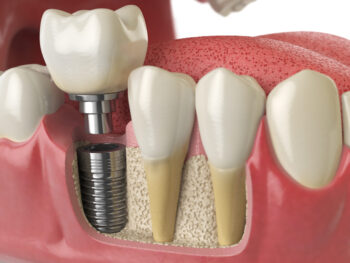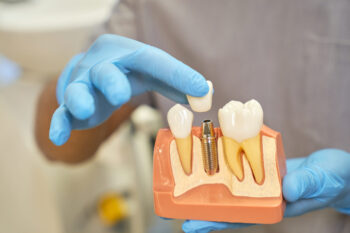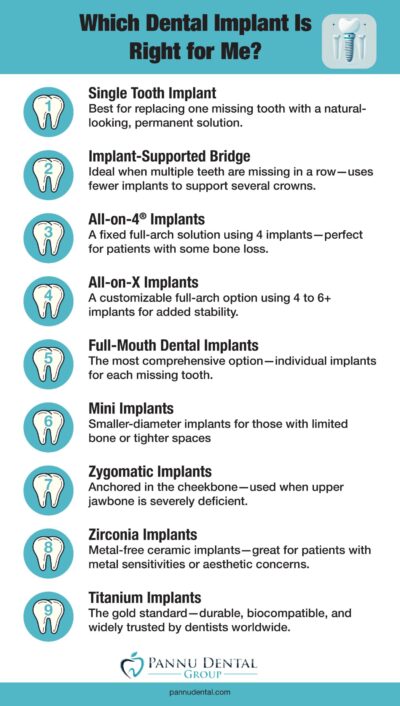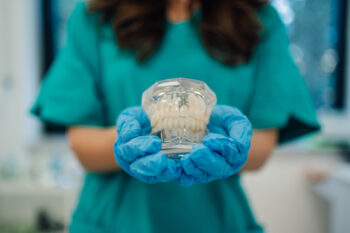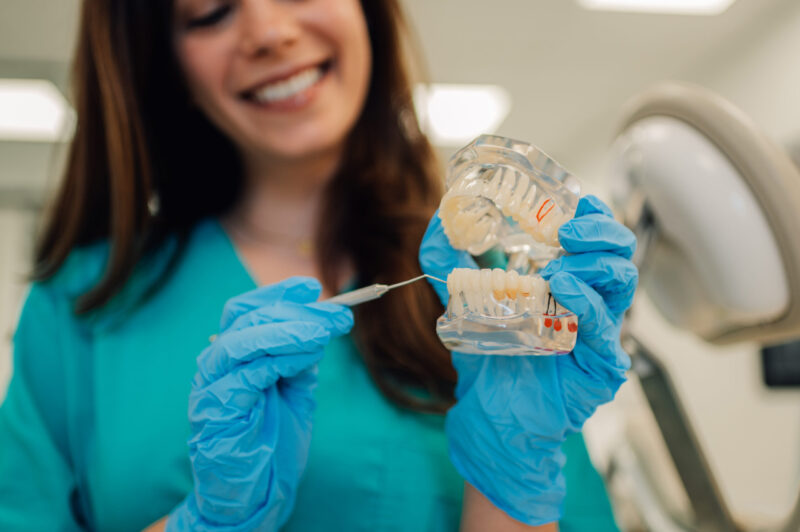
Many patients are considering a dental implant procedure for multiple damaged or missing teeth. It might be surprising to learn that different types of dental implants are available.
The different types of dental implants can vary widely, from same-day implants to less invasive techniques that are a permanent solution for replacing one or more teeth. This includes dental implants that promote healthy bone and combat bone loss.
The best way to explore these varying types of dental implants and determine the best option for your dental health is to consult with an expert in implant dentistry.
A caring practice like Pannu Dental Group can provide all the answers when it comes to dental implants. Our expert oral surgeons can put your mind at ease if dental implant surgery is the best -recommended treatment for your missing teeth and overall oral health.
For now, take a closer look at the different types of dental implants to learn more about what the dental implant procedure entails and how dental implants may vary depending on your specific treatment needs.
Table of Contents
What Are the Components of Dental Implants?
The 3 Main Types of Dental Implants
Full Mouth Dental Implants
Newest Technologies and Techniques in Dental Implants
Which Dental Implant is Best for You?
The Benefits of Dental Implants
Choose the Right Type of Dental Implants
What Are Dental Implants, and How Do They Work?
Dental implants are replacement teeth that are designed to look and function like your natural teeth. In addition, they are inserted into your upper or lower jawbone as a permanent solution for missing teeth.
Dental implants can entail a single artificial tooth or multiple replacement teeth. Furthermore, a dental implant procedure entails creating an artificial root system in the upper jaw or lower jaw (or both) and placing permanent artificial teeth on top of the implant foundation.
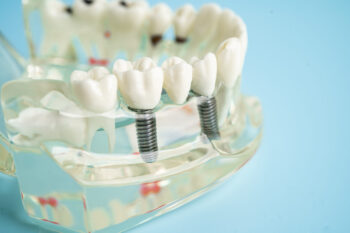
What Are the Components of Dental Implants?
Dental implants generally have three components, depending on the type of dental implants.
- The implant post serves as the artificial tooth root. It is typically made of everlasting titanium to ensure the dental implant placement is permanently immovable.
- The abutment is the connector between the artificial tooth root and the dental crown.
- The dental crown itself is designed as a permanent and lifelike solution to replace missing teeth, as the dental crown looks and functions just like your natural teeth.
How Are Dental Implants Placed in the Jawbone?
The best dental implant specialists rely on advanced technology for dental implant surgery. This makes the entire dental implant procedure comfortable and stress-free from start to finish.
For example, at Pannu Dental Group, we utilize the Yomi dental robot, which guides the dental implant placement and ensures there are no complications. This precise procedure helps provide a minimal healing process after the dental implant procedure is complete.
Be sure to talk to your dental implant specialist during the initial consultation at the dental office to ask about the tools and technologies your provider uses during a dental implant procedure.
From a single-tooth implant to traditional dental implants, your provider should have access to the best technologies and expertise possible. This is regardless of the type of dental implants that’s best for your distinctive oral health needs.
The 3 Main Types of Dental Implants
While there are many different types of dental implants and alternative treatment options, like mini dental implants or removable dentures, there are generally three primary types of dental implants that are used to replace missing teeth.
Endosteal Implants
Endosteal implants are arguably the most common type of dental implants. Additionally, they consist of implants that are placed directly into the jawbone.
Endosteal implants serve as the anchor for artificial teeth, and endosteal implants can be divided into different subcategories like all-on-four dental implants. Endosteal implants require enough jawbone to work effectively, or a procedure beforehand like bone grafting to ensure there is adequate bone for the endosteal implants placement.
Subperiosteal Implants
Subperiosteal Implants are somewhat like endosteal implants in that they are a permanent solution for missing teeth. However, subperiosteal implants are placed under the gum tissue and on top of the jawbone. Subperiosteal implants are often recommended for patients with insufficient bone density or height to support traditional dental implants. As a result, they provide support for artificial teeth without extra procedures, like a bone grafting procedure.
Zygomatic Implants
Both endosteal and subperiosteal implants focus on implants added to the jawbone. However, zygomatic implants are unique as they are strategically angled into the zygomatic bone in the cheeks to support implants. Compared to endosteal implants and subperiosteal implants, zygomatic implants are recommended for severe bone loss in the natural jawbone. Therefore, these dental implants have a stable and durable foundation without additional procedures like bone grafting.
Full Mouth Dental Implants – Options for Complete Tooth Replacement
When a patient has multiple missing teeth, or multiple teeth that are severely damaged, a dental implant specialist will often recommend full mouth dental implants. This is when dental implants can create an entire row of replacement teeth.
There are generally two types of full-mouth dental implants.
- All-on X dental implants require a specified number of six titanium posts, to serve as the foundation in your natural jawbone.
- All-on four dental implants, use four dental implant posts to support a full row of artificial teeth. All -on four implants are inherently a less invasive procedure, simply because only four implant posts are required to replace multiple teeth.
The type of full mouth dental implants you might need depends on multiple factors. Your specialist evaluates how many teeth need replacement and whether your bone and gum tissue can support implants. They also assess if you’re a good candidate for treatments like bone grafting or bone augmentation.
Zirconia vs Titanium Implants
When it comes to the posts that support your replacement teeth, two types of dental implant material are generally used: zirconia and titanium.
- Titanium dental implants are arguably the most common type of post because titanium is renowned as a durable material that can replicate healthy bone and even stimulate bone growth.
- Zirconia implants are another option that can offer better aesthetics and better biocompatibility. However, they are traditionally more expensive than titanium dental implants.
Your dental implants specialist will explain your options. However, titanium dental implants tend to be preferred because of their strength and durability.
Newest Technologies and Techniques in Dental Implants
There have been waves of progress when it comes to the technologies and techniques that power a dental implant procedure.
Dental implants offer a permanent solution for missing teeth, unlike removable dentures.
At Pannu Dental Group, we use 3D imaging and planning software to outline the entire dental implants procedure step by step. This helps to identify any issues along the way, like signs of periodontal disease or gum disease.
When it’s time for the dental implants procedure, our Yomi Dental Implant Robot ensures exact placement in your natural bone. As a result, this ensures that your dental implants remain comfortable for many decades to come.
To choose the right permanent solution for missing teeth, like dental implants, be sure to work with a dental implants provider that relies on advanced tools. These technologies help ensure a successful procedure with results that last for years.
Which Dental Implant Type is Best for You?
Your dental implant specialist reviews several factors during your initial consultation. These factors determine which type of dental implants best fit your oral health.
For the most part, the following considerations will be considered before a more detailed dental implants procedure is defined.
Bone density
Healthy bone is required to ensure that dental implants can last a lifetime. Therefore, your dental implant specialist will conduct a thorough examination of your natural bone to determine what type of dental implants is best for you. Additional procedures like bone augmentation may also be recommended beforehand to ensure that enough healthy bone exists for certain types of dental implants.
Number of missing teeth
The number of missing teeth directly influences the type of dental implants your specialists recommends. They also consider any natural teeth that may soon need replacement. Your specialist may extract severely damaged teeth. They do this if the teeth are expected to deteriorate over time.
Cosmetic goals
Dental implants can significantly improve your facial structure. Your dental implant specialist identifies structural issues to determine the best type of implant.
Budget
Many insurance companies cover dental implants. However, your budget plays a role in the type of dental implants you should choose. For example, certain materials like zirconia may inherently be more expensive, as can a prosthetic tooth that is made from costly types of metal alloys like gold.
Allergies
Believe it or not, some individuals can be allergic to certain types of materials used in dental implants, although this is extremely rare. Your dental implants specialist will test allergies to materials or even local anesthesia or post-treatment medications to ensure that the dental implants procedure has no complications.
The Benefits of Dental Implants
There’s a long list of benefits to choosing dental implants over temporary solutions like traditional dentures. Let’s take a look at some of these benefits.
Dental implants can improve oral health
Unlike traditional dentures or other long-lasting solutions like a permanent bridge, dental implants can improve oral health by stimulating bone growth and preventing gum disease.
Dental implants require no extra effort to maintain
When you wear dentures, there are many additional steps you need to take regarding oral hygiene. However, dental implants require basic healthy habits to work properly for the long haul, like brushing and flossing daily, and scheduling regular checkups at the dentist’s office.
Dental implants are cost-effective
When you look at the years of costs associated with traditional dentures and other temporary solutions, these expenses add up. However, dental implants are cost effective and are a one-time expense, and they are often covered partially or fully by dental insurance.
Dental implants entail a comfortable procedure
Although implants require dental surgery, many patients are surprised to discover just how comfortable the procedure is. Top dental specialists like Pannu Dental Group are adept at ensuring pain-free treatments, using local or generalized anesthesia to minimize discomfort along the way.
Dental implants function like natural teeth
With dental implants, you don’t have to worry about avoiding certain foods or drinks that can cause damage. Instead, you can enjoy what you’d like, as dental implants function just like healthy natural teeth.
Dental implants look great for a lifetime
While dental implants may be subject to mild staining for patients who regularly indulge in certain foods or drinks like coffee and red wine, dental implants are designed to look brilliant for many years to come – and more so than natural teeth.
Dental implants can last a lifetime
Arguably, the best thing about dental implants is that they are a permanent solution for missing teeth. Once the dental implant procedure and healing process have commenced, you will have a full set of beautiful teeth that can last for 15 years, 20 years, or even longer.
Choose the Right Type of Dental Implants for Long-term Success
Determining the best type of dental implants for your unique oral health needs requires care and guidance from an expert, and this is where Pannu Dental Group shines.
We are experts at dental implants and provide a range of alternative treatments for missing or damaged teeth. Our expert dental team can ensure that every procedure is flawless and puts our patients’ care and comfort front and center.
Reach out to our team of dental implants specialists today to start the conversation.
With an expert team of professionals behind the scenes, alongside the most advanced dental technology available, you can find a permanent solution for missing teeth that will result in a lifetime of beautiful smiles.
Schedule your consultation today!
Dr. Dalvir S. Pannu has been a practicing dentist since 1995. In 1996 he opened his first dental practice in India, where he gained invaluable experience and acumen. In October of 1997 he was invited by the American Dental Association (ADA) to present the table clinic on Endodontics, at their annual session held in Washington, D.C. At this time he fell in love with the United States and became passionate about practicing dentistry in California. He became particularly enamored of the San Francisco Bay area, and soon took up residence and work here.
